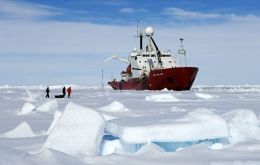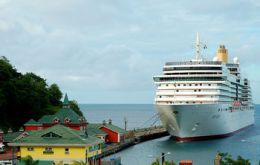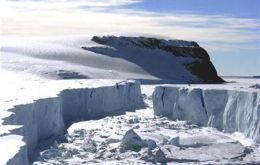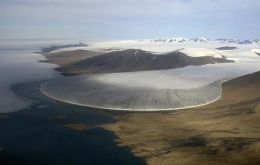MercoPress. South Atlantic News Agency
Tag: sea level
-
Wednesday, May 2nd 2018 - 08:13 UTC
UK-US launch Antarctica research program to predict sea-level rise

A new UK-U.S. Antarctic research program to improve the prediction of future sea-level rise was launched on Monday at British Antarctic Survey (BAS), Cambridge. The £20 million 5-year research collaboration, funded jointly by the UK Natural Environment Research Council (NERC) and the U.S. National Science Foundation (NSF), brings together over 100 polar scientists from leading UK and U.S. research organizations.
-
Wednesday, September 10th 2014 - 07:35 UTC
Caribbean nations beaches disappearing because o rising sea level and recurring storms

The World Bank says due to rising sea levels and recurring storms, the beaches in most Caribbean nations have started to disappear. In a new report, the Washington-based financial institution said, in some areas of St. Vincent and the Grenadines, for instance, an estimated 18-30 meters of beach have been lost over the last nine years.
-
Wednesday, December 5th 2012 - 19:50 UTC
Polar ice sheets melting have added 11mm to global sea levels since 1992

Nearly two dozen research teams collaborated to study polar ice sheets in Greenland and Antarctica and discovered definitively that they have added 11mm to global sea levels since 1992, melting ever more quickly.
-
Thursday, November 29th 2012 - 13:02 UTC
Post-Sandy, why urgent preparation is needed for storms of the future

By Lord Julian Hunt and Professor Johnny Chan.(*) - The devastation wrought by super-storm Sandy (253 deaths in the Americas and over 50 billion dollars in economic damage and disruption), is prompting renewed thinking about climate change and national security.
-
Tuesday, May 24th 2011 - 06:02 UTC
Global sea level projected to rise by one metre by 2100, says Australian report

The Australian Climate Commission has warned that acceleration of sea level-rise will be faster than anticipated. Global sea level is projected to rise by one meter by 2100, according to the Commission's first report published on Monday.
-
Wednesday, March 9th 2011 - 21:17 UTC
Ice losses in both caskets and rising sea level faster than estimated

Ice loss from Antarctica and Greenland has accelerated over the last 20 years, research shows, and will soon become the biggest driver of sea level rise. From satellite data and climate models, scientists calculate that the two polar ice sheets are losing enough ice to raise sea levels by 1.3mm each year.
